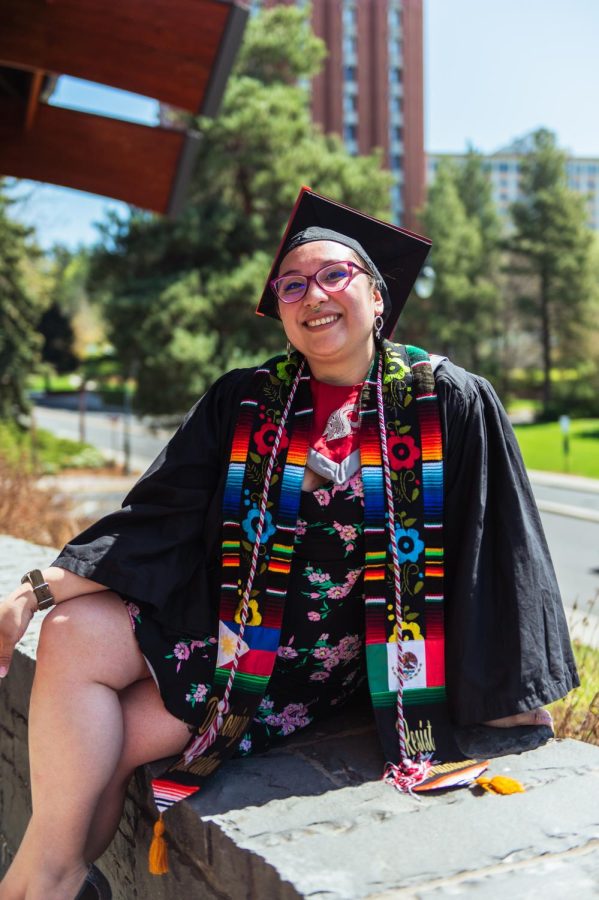For anthropology graduate, combating food insecurity is their passion
Shae is described as tenacious, inspiring
After graduation, Shae will be going to Guatemala for a medical mission
May 4, 2023
Shae McCarron (they/them) said their first job at WSU was with AmeriCorps, where they worked 45 hours every week for 10 months. They founded the Cougar Food Pantry. At the time, they were taking 17 credits to stay on track for graduation.
Nearly one-third of college students at four-year colleges are food insecure, according to a survey by Swipe Out Hunger.
“I hit the ground running with fighting food insecurity on campus. So the Cougar food pantry in the CUB was my baby,” Shae said. “And I really wanted to work hard to feed all the students and everyone has been super supportive of that.”
Shae said they came out before pronouns were a thing and had to learn how to use pronouns correctly themselves. The marginalization of the LGBTQ+ community is connected with food insecurity, they said.
“I said in [the Lavender Graduation] speech, we were the ones who always thought that it was okay to talk politics at the table because it was important. And that’s a huge part of my queer identity is not being quiet,” they said.
Shae has spent a lot of time in the LGBTQ+ Center listening to students’ concerns and seeing how impactful combating food insecurity is on campus. They have been involved in creating satellite food pantries in Thompson Hall, Johnson Hall, Avery Hall and Todd Hall.
Brian McCarron, senior in cultural anthropology and environmental archeology and Shae’s husband, said it is an accomplishment for his partner to graduate at 35 as a non-traditional student.
Brian said Shae wants to face the world’s most pressing problems headfirst.
“They see the vector for the most good that they can do being in the most tumultuous areas on the planet. So war zones, food insecure areas, impoverished communities, third world countries are their main focus,” he said. “They always want to put themselves in those uncomfortable positions. I’m always having to remind them we … probably don’t want to take our kids to Syria.”
Shae said they were living in the Philippines during the pandemic and had no intent to return to the U.S. until they got accepted at WSU. After finishing their associate’s degree remotely at Johnson County Community College while in the Philippines, they applied to “a ton” of universities all around the U.S. and the world.
Marsha Quinlan, anthropology professor at WSU, is a medical anthropologist, which Shae said helped draw them to WSU. Another factor in their decision to attend was receiving a sizable scholarship.
Shae said school pride was never a thing for her before WSU. They have been to seven different colleges, and their experience with every other college ranged from mediocre to awful.
“I really do have an unusual amount of pride for this school,” Shae said. “Just like my whole family, we’re walking downtown. When we pass those Cougars on the bridge, we’ll pat them on the nose and go, ‘Go Cougs.’ Our school pride is intense.”
The community in Pullman has been a support system, Shae said. They have had a core support group of peers in graduate school and the anthropology program.
Brian said he never had school pride before WSU. His overall consensus is that WSU has been a wonderful home and enriched himself and his partner.
“Honestly, I wasn’t expecting as much as I got from this school,” he said.
Meghana Mendon, doctoral student in bioenergy and bioproducts engineering, met Shae in the dorms during her first semester at WSU. At a social event for the dorm, Mendon went up to Shae to say hello. When the two started talking, Mendon decided they would be great friends forever.
Before coming to WSU for her Ph.D., she said she had never stepped foot outside of India. She came to the U.S. alone and Shae was her first friend.
“I am an introvert so it’s very difficult for me to go ahead and make new friends,” Mendon said. “They actually gather a lot of people around themselves. When I’m with them, I actually get to meet a lot of them. So my social network also develops when I’m with them.”
She said Shae boosts her confidence socially because they tell her to be herself. Shae has helped Mendon to understand the LGBTQ community, which has taught her how to communicate with the community respectfully.
“They’re a very good mother. They’re a nice friend. They are a good wife as well. I’ve seen how they are supporting Brian,” Mendon said.
Adam Atalig, senior in rhetoric and professional writing who helped to found the Thompson Hall food pantry, said he has connected with Shae because of their Filipino heritage. Atalig said his ability to connect with other Filipinos has been very limited due to the pandemic.
He said met Shae in an archaeology class.
“They were the TA and they just helped everyone in that class a lot,” Atalig said. “They made sure that every student was meeting the standard. But they also made sure that each student was successful.”
Because of their tenacity, Shae is one of the most inspiring people Atalig said he has met.
“They also showed me that there is a strength to vulnerability,” he said.
McCarron has jet-setting plans after graduation. They said they are first going to Guatemala for a medical mission. After that, they plan to work with the Kalispel Tribe in Washington. Finally, they will head to California for six months to do archeology.
In the long term, while Shae has plans to apply to graduate school, they said “Plans mean nothing” and you should keep yourself open to anything and then everything will fall into place.















